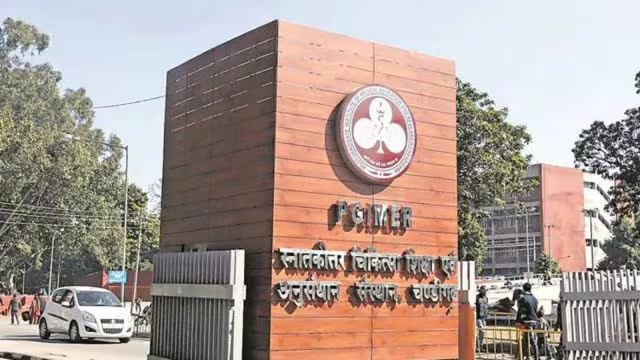
Move follows exposure of major scam involving stolen indent books and fake stamps
Chandigarh, April 4 – In a landmark move to combat fraud and strengthen transparency in patient care, the Postgraduate Institute of Medical Education and Research (PGIMER) has launched a complete online indent system across all 36 clinical wards and ICUs of Nehru Hospital, replacing the traditional manual indenting method.
This decision comes in the wake of a major fraud case involving the misuse of a stolen indent book and counterfeit departmental stamps to siphon off medicines and implants worth lakhs under the Ayushman Bharat-Pradhan Mantri Jan Arogya Yojana (AB-PMJAY) scheme.
Fraud Sparks Urgent Digital Overhaul
On February 18, 2025, PGI security and AMRIT Pharmacy personnel apprehended an individual using a fake stamp and stolen indent book to claim ₹60,000 worth of drugs under the Ayushman Bharat scheme. The accused was found in possession of an indent book from the Department of Urology and eight forged department stamps. He later revealed a wider scam linked to a Saharanpur-based network exploiting patient data and defrauding the scheme.
The case, currently under investigation by the Crime Branch, has triggered a broader inquiry into tampered files, missing bills, and complaints of stolen indent books related to Ayushman beneficiaries. Reports suggest around 100 files connected to the scheme may have been compromised.
Online Indent System Rolled Out on War Footing
In response, PGIMER swiftly developed a new online indenting system, initially rolled out in phases from March 18, starting with the C block of Nehru Hospital. Full-scale implementation across all clinical areas began on April 4, with plans to expand the system institute-wide by the end of April.
“Though HIS-2 was supposed to bring this shift, we acted immediately under HIS-1 in light of the fraud. Now, patient-specific indents are generated digitally by healthcare staff, ensuring transparency and real-time tracking,” said Dr Navin Pandey, Associate Professor, Hospital Administration.
Drugs Now Delivered Bedside, Not at Pharmacy Counter
Another major reform involves the direct delivery of medicines and implants to patients at their bedside by AMRIT staff, eliminating the need for patients or attendants to physically visit the pharmacy. AMRIT has increased manpower to ensure smooth implementation of this service.
PGIMER has also issued Standard Operating Procedures (SOPs) to assist medical personnel in using the digital system effectively, ensuring uninterrupted services to beneficiaries under Ayushman Bharat, HIMCARE, and CGHS.
“We have served over 1.4 lakh patients under Ayushman Bharat. This new system not only prevents misuse but aligns with our broader digital expansion strategy to improve hospital efficiency and safeguard public health funding,” added Dr Pandey.
Formal Complaints and Internal Probe Initiated
In parallel, PGI and AMRIT have filed formal complaints with law enforcement and formed an internal investigation committee to assess the extent of the fraud and recommend safeguards to prevent future lapses.
The move is being hailed as a critical step in restoring trust, securing government-funded healthcare, and pushing India’s premier institutions toward greater digital governance and accountability.

